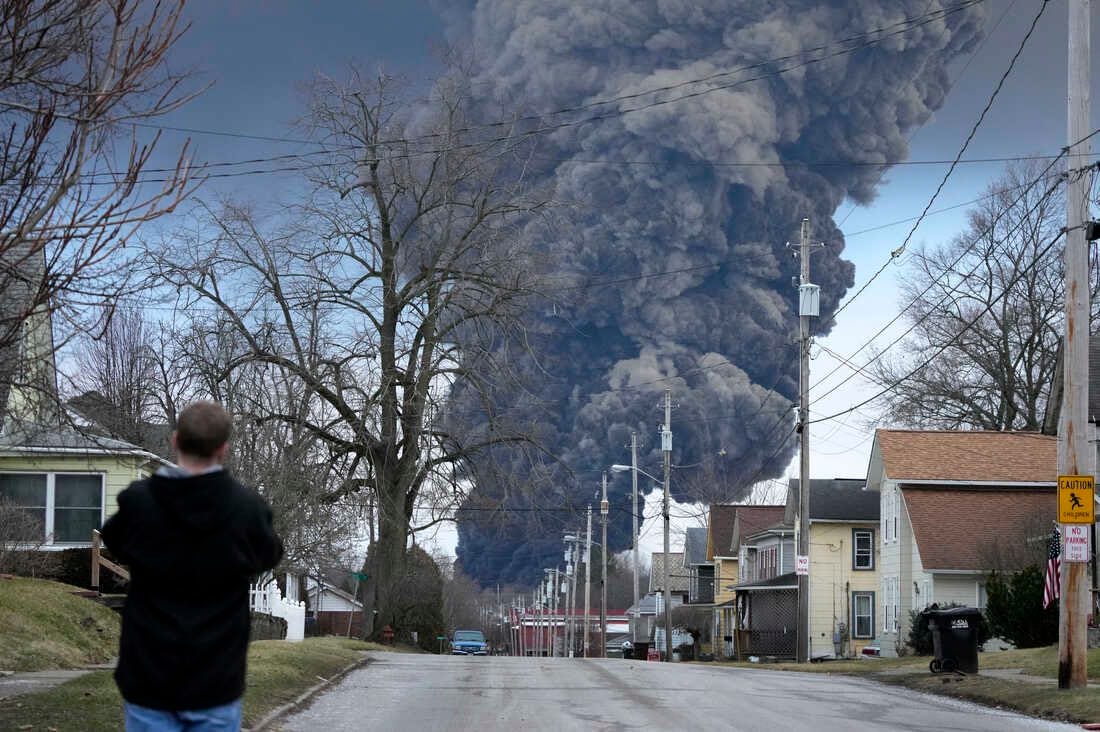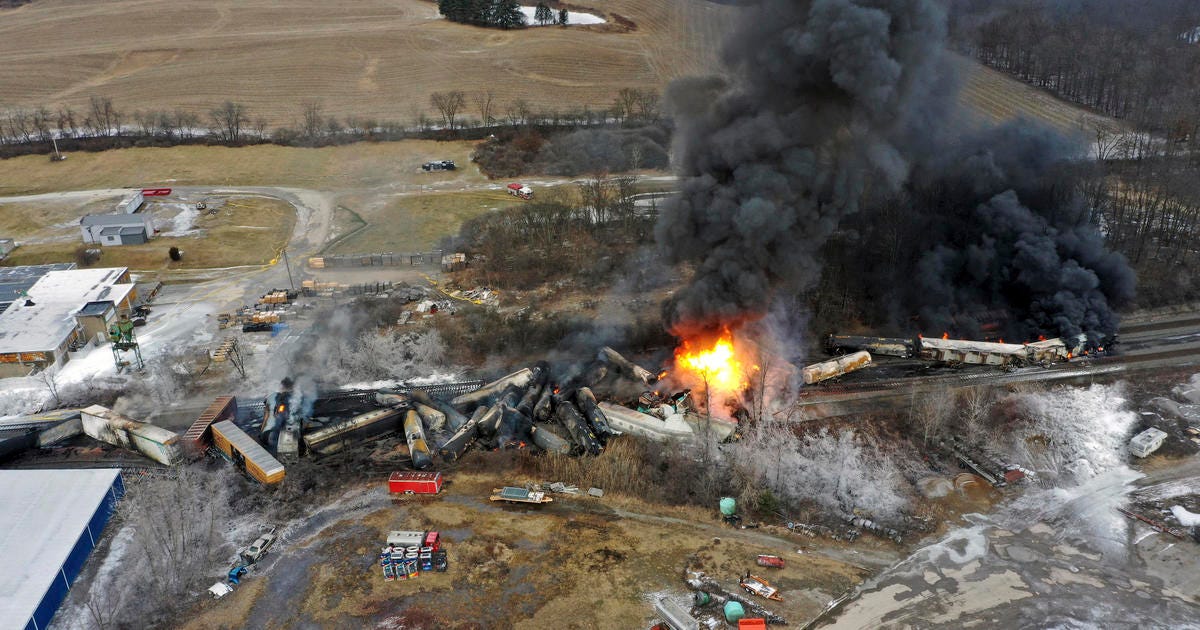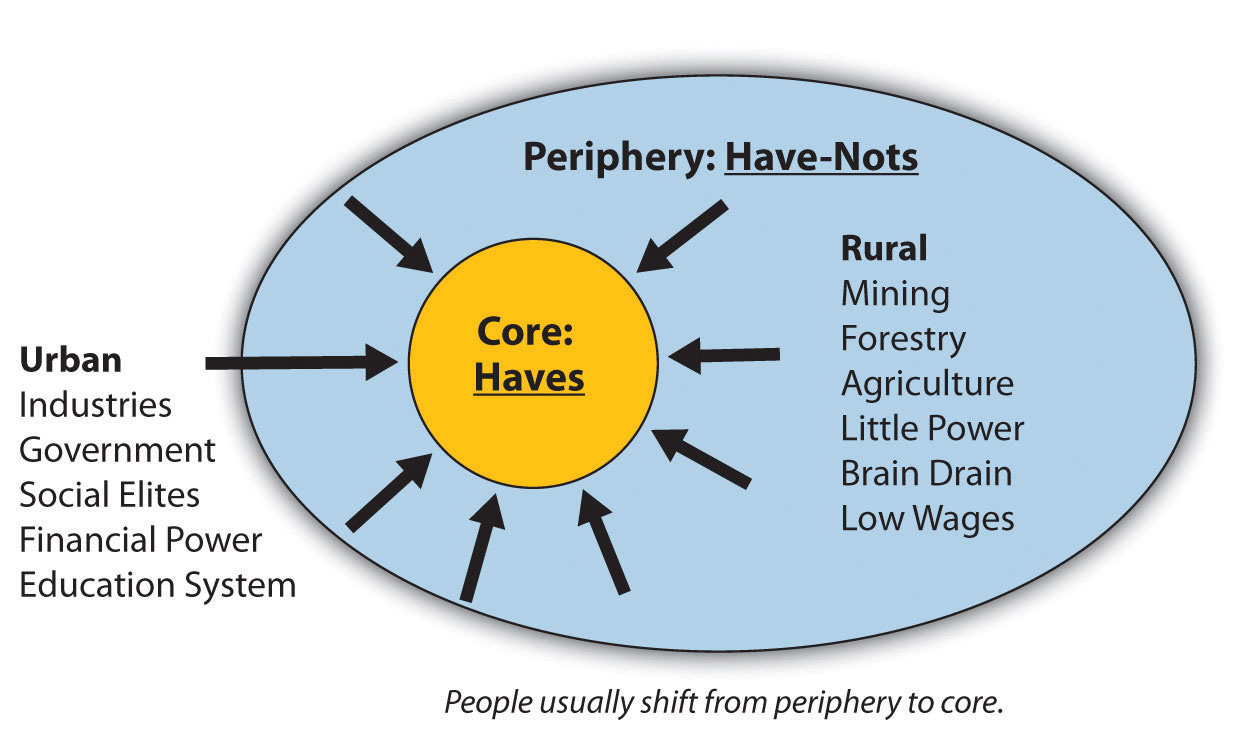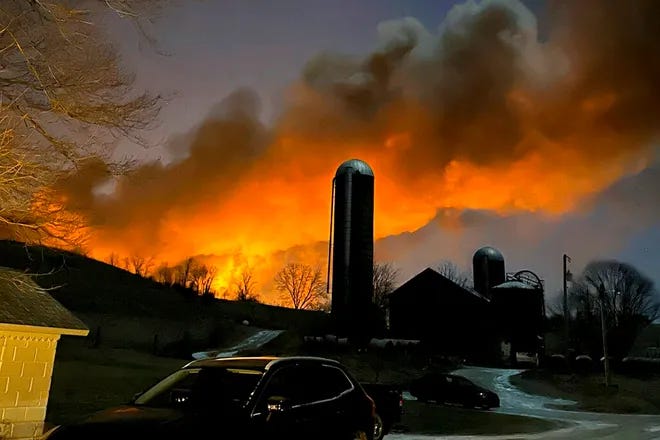The War Beneath the Surface
Behind America's façade of liberty lies a self-hatred of its forgotten places that is reaching a breaking point.

February 3: East Palestine, Ohio
A Norfolk Southern cargo train carrying dangerous chemicals derails. The following day, first responders find that local streams have been contaminated, and residents are asked to leave the area. From CBS: “First responders found evidence of one of the train cars releasing vinyl chloride, NTSB member Michael Graham said at a press conference. Vinyl chloride is used to make the polyvinyl chloride hard plastic resin used in a variety of plastic products, including pipes, wires and packaging materials.” It is also apparently possible that the state wasn’t even informed of the trains hazardous contents.
On February 6, both Ohio Governor DeWine and Pennsylvania Governor Shapiro order residents in the immediate area to evacuate, to allow Norfolk Southern to conduct a “controlled release” of the train cars. On February 8, residents are allowed back into their homes as if nothing had happened. But locals quickly began to discover that all was not as it seemed. Countless stories of contaminated riverbeds, mass die-offs of fish and wildlife, and strange cloud formations began to circulate online as people realized their town would never be the same again.
The events of the last few weeks have left a bitter feeling deep within the pit of my stomach. A clear and ominous disaster with photo, video, and physical evidence, practically ignored in the major press outlets of the nation for many days before finally gathering momentum. The government’s reaction, or rather, its inaction, shocked residents and sickened those watching the events unfold. But when the locals asked for answers, they were met with derision, gaslighting, and stonewalling by Norfolk Southern, their government, and the media. Few seemed to be paying any attention.
Now you may be thinking – hold on, is that really how all of this is supposed to work? No warning, no questions, no discussion, no funding, no FEMA, no government investigation? Just a quick handshake between one of the nations largest corporations and politicians to effectively nuke a small town and leave without telling anyone why it happened and how to make sure it won’t happen again? For residents of towns like East Palestine, sadly, this response from corporations and the government has become an expected part of a cycle of abuse by our ruling class. Take the media’s contextualization of the story, which seemingly defies reality: “After a train carrying toxic material derailed in Ohio this month, Right-wing commentators have been particularly critical of the response, using the crisis to sow distrust about government agencies and suggest that damage could be irreparable” crowed the New York Times, two weeks after the tragedy had occurred.
Get that? It’s not the fault of Norfolk Southern for burning train cars full of chemicals, or the government for ignoring the scale of the danger and talking down to local residents. No, it’s the elusively vague “right-wing commentators” who are really responsible for the wrongdoing here (apparently being mad about a major corporation’s negligence now makes you “right-wing”). You see, according to the Times, it’s simply misinformation. This feels right on the snobbery mark for the Times, where articles that soothe its readers not to concern themselves with the conditions of those they perceive to be as members of the American peasantry are commonplace.
The Biden Administration couldn’t even be bothered to respond to the tragedy. Ohio’s request for FEMA assistance was denied, and they were told that they were “not eligible for assistance”. Norfolk Southern seemed nowhere to be found, only popping up out of their proverbial foxhole to offer an insulting payoff to locals for their silence (this as the White House backs Norfolk Southern in its bid to limit its exposure from lawsuits). Even now, three weeks later, the administration chooses to visit their corrupt puppet regime in Ukraine rather than Ohio.
Think that’s insulting? It gets worse (the administration just couldn’t help itself): during his photo op in Eastern Europe, President Biden announced that we will be sending another half a billion dollars, bringing the grand total to well over 100 billion and counting, to continue playing armchair warlord with the administrations favorite new vassal state. This at a time when the people of East Palestine are exposing chemical plumes in their local creek beds, and seeing livestock die in sudden and terrifying accounts of possible chemical exposure. Only after former President Donald Trump announced he would be visiting the town did the government finally realize it’s error in political judgement. By now, residents can see through the hollow slow-rolling of aid for what it is. They don’t genuinely want to help - they just don’t want to look bad when compared to their most hated political enemy.
One small town in Ohio simply isn’t worth the trouble to our ruling elites – but pouring well over a hundred billion of our tax dollars into the pockets of a corrupt and autocratic regime in Ukraine, flooding the zone of Eastern Europe with weapons, deliberately escalating conflict with Russia, using Ukrainian civilians as human shields for American imperialism, and pushing us to the brink of World War 3 are all worthy causes for Washington and their acolytes in the press. Priorities being what they are for our elites and their supporters, it should come as no surprise that funding neo-Nazi brigades in Ukraine is a more important focus for Washington than cleaning up after one of the nation’s largest political donor industries.
During a town hall on February 15, one resident asked why they weren’t getting support outside of a measly one-mile radius from the accident. The answer? “Because that’s what the Department of Transportation told us to do.” On February 13, the head of the Department of Transportation Pete Buttigieg made no mention of the Ohio train derailment while attending a conference, but instead was busy focusing on the problem of “whiteness in the construction industry”. By the time he was finally forced to acknowledge the tragedy in East Palestine, he quipped “While this horrible situation has gotten a particularly high amount of attention, there are roughly 1,000 cases a year of a train derailing.” This was two weeks after the train had begun leeching carcinogenic contaminants into the community.
See – it’s not the lack of a federal disaster response, or Norfolk Southern’s incompetence that is causing so much pain; what’s keeping them up at night (if at all) is the fact that people had the audacity to notice the problem. It’s not the pain and suffering of East Palestine you should be worried about, but the fact that the high and mighty government and corporate elites had to be inconvenienced by all this unwanted scrutiny. This feels right on the mark for the Biden White House, which has made an artform out of shirking responsibility and gaslighting the public when it comes to its own incompetence. Even now the EPA says the air and water are safe, but how can anyone take them seriously when observing their actions? Distrust in this case is right, by the way – the EPA’s approval of the water was based on tests sampled by Norfolk Southern itself, the very company responsible for the crash.

It’s easy to accept the slow and steady decline of a society due to the corruption of its leadership class when you have no recourse against them and no tools by which to hold them accountable. It’s also easy to accept that perhaps nothing can be done to change the system because the people who are suffering have no power by design. This feeling is all too familiar to the forgotten places of America. East Palestine represents the rule, not the exception, in how the ruling class of America treats its forgotten people. Whether it's coal mining, infrastructure degradation, offshoring of factory work, drug addiction, or any other number of political grievances, it's clear that these areas of the country are seen by our elites not as places of equal worth, but as dumps and depots: piñatas to viciously bash, grab, and leave a broken mess in their chaotic wake.
The problem goes far deeper than one train derailment. Throughout the United States, the government and businesses abuse these places because their basic interests do not with the people who live in these forgotten places. Stated more plainly, it is a cycle of internal colonialism, with tactics such as spiritual, political, and even chemical warfare employed by the powerful to keep those they view as their colonial subjects in line. The theory of Core and Periphery explains the basic idea of this phenomenon. When applied to the United States, it can shed light on the dynamics at play that seem to result in this repetitive cycle of abuse.
The premise of the theory can be brought from the international to the national lens. Internationally, the world (or in this case, the country) can be divided into two separate spaces: the Core and the Periphery. The Core is defined as urbanized, “advanced” (by their own standards), densely populated, and wealthy. The Periphery is defined as rural, usually agrarian, more sparsely populated and less organized. In the theory, Core nations abuse Periphery nations by colonizing, controlling, or containing them in order to extract wealth and resources. Taken a step further to our application, the Core of an individual nation will abuse and exploit its fellow citizens in that nation’s Periphery for the same purposes.

The goal of the Core is control and wealth-building from the extraction of resources in untapped areas. In the United States, that might take the form of coal in Appalachia, oil in Texas, gold in California, or even labor in the Midwest. By extracting these resources, powerful entities and individuals in the Core gain wealth to build their companies, power to build their political careers, and prestige to improve their standing in society.
It is important to note that this process will always occur, because no nation is static. Growth is always sought after because human nature demands it. It cannot be stamped or trained out of the human mind. This desire is an inherent part of who we are as a species and is what has led to both incredible progress (such as fertilizer) and destructive advancements (such as chemical weapons). Our obsession with “progress” for its own sake is a force of nature, one that often comes into direct conflict with our traditional pillars of society.
In the United States, the closing of the frontier meant that this basic need by the Core for resources needed to be satiated by peripheries inside the country. So began a cycle: American elites in business and government going from place to place, bulldozing long-standing traditions and taking what they needed. This is colonialism by any other name, but turned inward against our own citizens. It was, and continues to be, bloody, violent, and messy work. There have been many instances of this cycle destroying entire communities in the Periphery in the name of resources and power for the Core, but I suggest listening to Daryl Cooper's "Whose America?" podcast where he discusses the motivations, attitudes, and cultural convergences that define this phenomenon through the lens of the West Virginia Coal Wars in the early 1900s. It is a fantastic representation of how the greed of the Core can come swiftly, violently, and without mercy to even the quietest corners of the country.
This internally focused colonialism is not a new tactic: it's a tried-and-true method of control by the Core over the Periphery, driven by a few important factors regarding the Core and its position of both dominance and dependence:
1. Elitism: The Core’s residents tend to see themselves as the "best" version of the country, the most progressive, the most advanced, the most important, etc.
2. Resources: The Core is heavy on consumption but light on resource availability.
3. Power: The Core holds more political and institutional power.
While all three points are important to contextualize motivations, the theory is best explained as a method of exercising political extortion and control. The Core abuses the Periphery and takes its resources at will, as needed, by exerting its influence over institutions and leveraging its control over society. Its tactics, methods, and demands may change depending on the era or location, but the Core can never be fully satiated due to the nature of its forward momentum.
The Constitution of the United States, therefore, can be seen as an attempt to balance the power of the Core and Periphery more fairly in the structure of government as a hedge against human nature’s incessant demand for more. Diffusing national power rather than concentrating it too heavily is the most ingenious part of its design. But even they knew that this would not last forever, as Thomas Jefferson wrote to John Adams in 1787 his famous line, “The tree of liberty must be refreshed from time to time with the blood of patriots and tyrants.”
Eventually, the power of the Core consumes everything if left unchecked. Like locusts, they can come into Periphery towns waving money, lawyers, soldiers, and political power around so fast as to give you whiplash, and be gone before you even had a chance to ask who they were. The only way you will know they were there is by the destructive and humiliating mess they left behind for you to deal with. Some examples of this plague include but are not limited to; companies abusing miners’ rights, car companies offshoring factories, casinos absorbing the entire economy of small towns, drug companies flooding rural villages with opiates, rail companies burning hazardous chemicals, the federal government recruiting young men for its foreign misadventures, and many more we simply do not have time to discuss. The times and resources may change, but the paternalistic elitism of the Core does not. Whether the resource is coal to burn or blood to spill in foreign wars, the Core does not stop.
In truth, it cannot stop. It's not in the nature of the Core to stop. Why should it? It views the Periphery (and its resources) as its birthright. These resources are crucial to its position at the pinnacle of societal power and influence. They are the fuel for the machine of control that the Core is so fond of. Why should Core residents put their power or comfort at risk for the sake of some random hill dwellers, rail workers, cattle ranchers, or corn farmers? Why should the Core - the elites, the educated, the wealthy, the powerful, the supposed "best" of society - care what happens to a few Periphery peasants? See, WE know what's best they'll say, It's for your own good. Don't question us... or else.
They’ll refuse to visit your state during a campaign because they don’t think it’s worth their while, that your compliance is a guaranteed baseline reaction to their benevolent rule. They’ll belittle you with comments about your residence in “flyover country”. They’ll mock you for your values and traditional way of life. And they will take, take, take, more and more until you have nothing left to give them but your life.
In the end, the Core abuses those in the Periphery because it can. It won't stop until:
1. The Periphery forces it to set a truce.
2. The Periphery shows it's in the Core’s best interest to stop abusing it.
3. The Periphery threatens to separate from the Core, forcing it to the negotiating table.
Since the Core holds sway over societies institutions, it can mobilize and organize more quickly and effectively. Therefore, the burden of action always lies on the Periphery. So how can those in the Periphery fight in a way that restores their dignity, and forces the Core to treat them as equal partners in society? Below are just a few of many such cases in United States history where the Periphery found themselves up against the wall of extinction. Often, it’s simply about figuring out how to survive amidst the chaotic nature of change, whether it be productive or destructive, which is driven by the Core.
A) In Mingo County, West Virginia, when the abuse of the coal miners and their families forced them into drastic action, miners took up armed rebellion against company thugs, local police and the government. The miners’ hands were forced because no one stood up for them. Their homes were taken from them, their communities were ravaged, and they were actively terrorized. Eventually, they had enough: and while the rebellion didn’t save the miners outright, it sent a message that there are limits to the patience of even the most honorable of people.
B) Farming subsidies get a lot of flak but they are there because the Periphery was able to organize enough special interest power to show that their continued existence is worth the small sacrifice in tax revenue for the good of the nation. By satisfying the Cores' need for security and resources, they showed that it was in the Core’s best interests to at least tone back or limit its abusive nature. It hasn’t stopped large agribusiness and government regulators from exerting control over much of the nation’s farmland, but it at least allowed farmers to continue to exist as a partner group within the patchwork of society.
C) The Civil War had multiple aspects to the Core and Periphery theory, with multiple Cores and multiple Peripheries engaging in this chaotic portion of our history. Slavery had reached its limit, and slaves had been kept in an artificial Periphery for far too long by the Cores of southern states. Slave labor was the Periphery resource that kept the Southern economy afloat while the North was industrializing. At the same time, the South felt themselves as being kept in a Periphery by the Core of the North, which had a hungry need for the natural resources being produced by southern plantations to keep their factories running. In the end, the bloodiest war in our nation’s history brought all sides into a direct conflict because none of these groups could negotiate their way out of the problem.
East Palestine, Ohio and places like it are reviled by Core residents as backward, stupid, racist, and second class. It is consistently subject to the Core’s propensity for political punishment, psychological abuse, and social torture. Getting political or business leadership to suspend its indifference to their problems long enough to fix them is an uphill battle and a full-time job. Flint Michigan represents a good example of how the Periphery can use sympathetic sentiment in the Core to boost their bargaining position, but it's a half measure. Paternalistic attitudes in the Core allow them to feel good about taking action despite willfully ignoring the root causes of problems. Flint’s water, while “fixed” in the eyes of the federal government, media and politicians, is still a problem for residents. But the Core’s residents have moved on from their temporary sympathies for this one Periphery community to more chic and socially acceptable societal topics, such as social justice and warmongering in Eastern Europe.
So how can we break this cycle? First, we need to find new methods to organize against those in the Core and new ways to exercise power so that we can break through their elitism. But Core elites on the coasts and in big cities have been waging spiritual warfare on Periphery towns like East Palestine for generations because they see them as colonial subjects for exploitation, not citizens of equal measure. Meaning, even if you get their attention, there is a very low chance that they will agree with your perspective on any given conflict. Even the lightest of political resistance raises the hackles of the Core and sets its teeth on edge. Here are a few examples which highlight the attitude of superiority and indifference of those in the Core that is directed towards the concerns of those in the Periphery:
- The federal government has shipped billions of our tax dollars overseas while our infrastructure degrades at home.
- The President of the United States called everyone who didn’t vote for him fascist enemy of the state during a State of the Union address.
- Our towns are being hollowed out, ravaged by drugs and suicide and wholly ignored by our political class in Washington.
- Thousands of men and women were shipped overseas to die in wars based on lies and greed.
- The federal government crushed a major rail strike at the behest of big business.
- Social media companies censored citizens to influence elections at the behest of the government and in the favor of Core elites.
- Law enforcement has been weaponized, even going so far as to declaring parents terrorists for speaking their minds at local school board meetings.
This is just a small snapshot of an exploitation so constant and total that many people simply accept its constancy. East Palestine might be able to mount some sort of response and soul-searching in the Core if they can capitalize on the shock of this particular calamity, but the Core will not change its general attitudes towards these areas until it is forced to. It's hard to imagine what that might look like in an era of indifference, decline, and despair.

Whether it be the mountains of Appalachia, the farms of the Midwest, the mill towns of New England, the old factory communities of the Rust Belt, or any of the thousands of forgotten places across this country, the Periphery needs to figure out how to synthesize their anger and grievances into an organized movement that can bring the Core to the negotiating table. There is hope, as these are the conditions which are ripe for a political awakening. The rise of populism on both the left and the right are shots across the bow – warnings to the Core that even while under their proverbial thumb, we still have some fight left.
It is worth remembering that the American Revolution did not happen in a vacuum. It was a product of the same cycle of abuse and exploitation by the British Crown against the 13 Colonies. The Core elites and their supporters in Great Britain thought of us here as lowly peasants – ruffians and fools, ignorant nobodies to be brought to heel. But eventually, the people had enough of this abuse, and threw off their oppressors from the Core across the sea. The Periphery became free.
What will we do?


